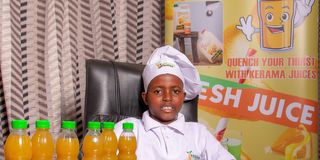
Jordan Kerama(left), his mother Clare Nyaboke Orina and other employees of Kerama Juices a business that was born out of Competence Based Curriculum(CBC) assignment from school in 2020, instructing Kerama to come up with a business idea that he presented to other pupils in class. Now it is a family business.
In 2020, seven-year-old pupil Jordan Kerama came home with a Competence Based Curriculum (CBC) assignment that would change his life and his family’s forever.
The assignment required pupils to come up with a business idea and present it to their class.
But little did Jordan’s mother Clare Nyaboke Orina know that this school project would soon blossom into a successful fresh juice business named Kerama Juices.
Like most parents, Ms Orina was used to helping her children with school assignments.
But when her son Jordan asked for help brainstorming a business idea, she suggested he pursue something related to programming given his active interest in Information Technology.
However, Jordan had other plans and said he wanted to do something in the kitchen.
It was a Sunday, and Ms Orina remembers she was not particularly eager to help out and asked his son to go the kitchen on his own, instructing him to use whatever ingredients were available for his project.
YouTube inspiration
And drawing inspiration from YouTube cooking videos he had previously watched, Jordan, now 11, decided to make a smoothie—something he had seen people do online.
Using bananas and avocados, he created his first smoothie and proudly presented it to his mother about an hour later. To her surprise, the drink was not only delicious but also showed initiative and creativity and in that t moment that Ms Orina realised her son was onto something special.
The next part of Jordan’s school assignment required the students to sell their business idea. Inspired by his initial success he boy made four more glasses of his smoothie, selling them to his parents for Sh200. His family eagerly supported him, excited by his entrepreneurial spirit.
The final stage of the assignment involved taking photos and videos of the product and sending them to the class teacher.
In a twist, the teacher gave students the opportunity to take their products to school and sell to fellow pupils, teachers, and staff members and for this, Jordan had to come up with a name for his business.
The Grade Eight Pupil decided to name it Kerama Juices, using his second name.
The family prepared five liters of juice for the school sale going the extra mile to print a label with the company name and purchasing disposable cups to make the presentation more professional, despite the school suggesting they could use regular cups.
At Sh50 a cup, Jordan ended up selling juice making Sh4,350, with a profit of Sh3,000.
“I had to explain to Jordan that he had just made money from his school project. It was such a unique moment. As a parent, I was only doing my duty to support his education, but it became much more than that,” recalled Ms Orina, a mother of two, in an interview.
What started as a fun project for Jordan quickly gained momentum and Ms Orina posted photos of her son's juices on her WhatsApp status.
Soon, her phone was flooded with inquiries from friends and family members asking about the flavours and whether they could place orders. What had begun as a school task quickly transitioned into a business opportunity, and Kerema Juices started receiving regular orders from teachers, parents, and other clients.
Despite initially not planning to start a business, Ms Orina couldn’t ignore the growing demand.
With the Sh3,000 profit from Jordan’s school sale, they reinvested in more fruit which allowed them to fulfill the growing orders from the neighborhood in Nakuru’s Lanet Estate.

Jordan Kerama, the Founder and CEO of Kerama Juices. The business was born out of Competence Based Curriculum(CBC) assignment from school in 2020 instructing him to come up with a business idea which he presented to other pupils in class. Now it is a family business.
And it wasn't long before Kerama Juices became a fully-fledged family business.
The journey was not without its challenges as during the first three months, Ms Orina and her family faced many obstacles like struggling to get the juice consistency right to sourcing quality fruits at reasonable prices.
“Sometimes, we added too much sugar or made the juice too thick. Other times, we couldn’t find good quality fruits,” she said.
But through trial and error, they learned the intricacies of the juice business.
The family soon developed unique formulas for their smoothies refining their product to meet the needs of their growing customer base.
Eight months into the venture, they made a significant investment by purchasing a commercial blender for Sh15, 000 and a sugarcane crushing machine for Sh65,000. This equipment helped them increase production efficiency and meet the growing demand.
Today, Kerama Juices offers over 40 different juice flavours, a significant jump from the initial banana-avocado smoothie that started it all.
Healthy options
Popular combinations include mango lemongrass, pineapple, and mango beetroot. They’ve also introduced health-focused options like pineapple mint with cucumber, which is popular for weight loss, and apple detox juices.
“We focus on using natural ingredients to cater to different dietary needs. We offer juices for people with acidity issues, those looking for appetizers, non-appetizers, detoxifiers, and many more,” Ms Orina told Nation. Africa at her Lanet minishop where the juice business is located.
Kerama Juices produces between 10 to 400 liters of juice daily depending on the season and customer orders.
Their products are sold in various sizes to accommodate different customer needs ranging from 250 ml bottles go for Sh 50, 500 ml bottles range from Sh 100-150, half-liter containers sell for Sh 100-200 and one-liter bottles are priced between Sh 200-300.
Ms Orina’s background in industrial chemistry and environmental science played a crucial role in the company’s growth. She applies her scientific knowledge to ensure the juices are nutritious and of high quality.
They even conduct tests in a small lab before releasing new products to the market.
The business has expanded significantly, with two shops now open—one in Nakuru’s City centre and Lanet.
They also offer delivery services to offices, events, and individuals across the region.
Ms Orina has left her teaching job as a lecturer to focus entirely on Kerema Juices and her water refilling venture. The business now employs seven people, including three marketers, two production workers, and one fruit sorter and preparer.
“What we believe in is giving people fresh and sweet juice, our juices are unique, we do a number of research to ensure that what we are making is nutritious, not just picking any fruits and mixing. We have a lab where we try it before taking it to the market,” she added.
While they can’t give Jordan direct access to the business profits since he’s still young, they save much of the money earned for his future education and use some to pay his school fees.
"We cannot give him money since he is still young. The profit we make we save and partially use to pay for his school fees. It was his business idea we want when he grows up he picks up from something that is operational, he is the founder and CEO of the Kerema juices," said Ms Orina.
She says much of Kerema Juices’ success can be attributed to social media marketing and word-of-mouth referrals and further Orina notes that many of their clients have been acquired through online platforms and recommendations from satisfied customers.
Their biggest clients include event organisers, schools, wedding planners, and individuals hosting private parties who want fresh juice options for their guests.
“I thank God for the far we have come. It hasn’t been easy, but for anyone looking to start a business like this, patience and consistency are key. Truly, innovation can come from the most unexpected places, even a child’s homework,” she says.
The plan is now to expand Kerema Juices into major supermarket outlets across Kenya, making their fresh, nutritious juices available to more people.








